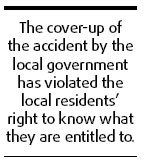Sense of rumor
When official channels block information, rumor prevails. That is what happened in Qixian county, central China's Henan province.
The rumor of the possible explosion of cobalt 60 in a local plant caused a lot of confusion and fear among local residents, who fled their homes to seek shelter elsewhere during that weekend. The local government did not release any news about the accidents that occurred on June 7 until residents on the run almost paralyzed traffic on the road leading to neighboring counties.
Higher-level environmental protection authorities, along with the county government, held a press conference to confirm that there was no leak of radioactive material. There were live broadcasts from the accident site on the local TV channel and experts appeared on air to reassure local residents on environmental security.
Thereafter, five locals were pinned down as rumormongers; one was detained and others given disciplinary punishment.

We don't now how these five spread the rumor. The person detained was reported to have re-circulated a piece of online news about the explosion. Doubtless, it is not right for anyone to spread unconfirmed news as it can spread panic among the general public.
Yet, we cannot but feel perplexed why the local government had been silent for more than a month after the accident took place. It is this silence that allowed rumors to become so pervasive and take hold of public imagination. The more tight-lipped the local government is about the accident, the more residents will choose to believe what is rumored.
The explanation of local environmental protection authorities is not convincing. On one hand, they said that they did not feel it necessary to disclose information about the accident because it did not cause any radioactive contamination. On the other hand, they said that they feared that disclosure of the accident might cause panic among the public.
Thus, it was actually not so much the rumormongers as the local government decision-makers who should be held responsible for the confusion and alarm.
In the first place, they violated the rules on disclosure of information, which came into effect last May. One clause requires that government must disclose true information when wrong or incomplete information is likely to disrupt social stability. Obviously, wrong or incomplete information about this accident involving radioactive source was quite likely to cause panic among residents, who have the right to know of the occurrence.
The cover-up of the accident by the local government violated the local residents' right to know what they are entitled to. If local residents are inclined to think otherwise when the government tells the truth, it must be because the latter has lost credibility. And, attempts at covering up will only aggravate the credibility crisis.
(China Daily 07/22/2009 page8)














